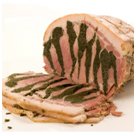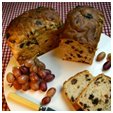A talk on the Taste of Lincolnshire by Neil Curtis (master butcher)
Kitted out in his customary white Trilby and blue and white striped apron automatically affirmed his trade as a butcher and we sat mesmerised as Neil honed his carving knife on a steel with the flourish and confidence that only a professional can, and the super deep blade glinted as it caught the light. He laid out his wares, prepared his table and observed his audience as we sat back in anticipation.
Neil began his talk with a potted history of pig rearing. He reminded us that it was once very much the norm for many country folk to have their own pig at the end of the garden and, after it was fattened, slaughtered and then butchered, not only could you ‘eat everything except the squeal!’ but also use its bristles to make paintbrushes and its skin to make leather. Surprisingly, things have not changed that much since those days and, although we might not eat ‘everything’ from the pig nowadays, there is a growing export market particularly to Asia and the Caribbean for what we do not eat so much of such as the ears and trotters.
 As he got busy opening a tub containing brawn, some of our mouths began to salivate. We were informed that brawn was made from the pig’s head although meat from the bones and trotters can also be included. As he divulged its process of production he then delved into his box and brought out two plates of brawn which were duly taken to the audience for them to try.
As he got busy opening a tub containing brawn, some of our mouths began to salivate. We were informed that brawn was made from the pig’s head although meat from the bones and trotters can also be included. As he divulged its process of production he then delved into his box and brought out two plates of brawn which were duly taken to the audience for them to try.
Neil was keen to remind us that we are most fortunate in Lincolnshire to still have numerous independent butchers, all of whom are very proud of their products. Each one still has their own method of making such traditional old delicacies as chitterlings which uses intestines and stomach or pigs fry comprising meat and offal. Apparently local custom says that if you receive a plate of pigs fry, the plate should be returned unwashed for good luck. It was also commonly held that pork products should only be eaten when there was an R in the month but thankfully, modern food technology means this allegory need no longer be followed.
We all know the Lincolnshire sausage enjoys a celebrated status in the county and has its very own festival dedicated to it however, some may not know that its distinctive taste comes from the sage that is added to the coarsely ground pork (as opposed to minced pork  used elsewhere) ; this also gives it its characteristic chunky texture. Another Lincolnshire traditional food is haslet which resembles a pork meatloaf with herbs; it is typically served cold and we were able to savour its quality as plates of it were also distributed amongst the audience to enjoy.
used elsewhere) ; this also gives it its characteristic chunky texture. Another Lincolnshire traditional food is haslet which resembles a pork meatloaf with herbs; it is typically served cold and we were able to savour its quality as plates of it were also distributed amongst the audience to enjoy.
Many celebrity chefs have popularised the cooking of what used to be considered the cheaper cuts of meat and, according to Neil, a good example of a tasty product from a  lesser cut of meat is stuffed chine which he refers to as ‘Lincolnshire’s best kept secret’. The chine is basically the pig’s backbone and, once cured, the meat is slashed at right angles and usually stuffed with parsley, although other ingredients are sometimes used according to the season. Once again Neil delved into his box of delights and retrieved some plates laden with this savoury tidbit so everyone could have a taste. Judging by the many comments made at the end of Neil’s talk, to many of the audience, these foods and their historic connection to Lincolnshire were well-known and appreciated however, to others, this was fresh information and brand new tastes. One older member recounted a personal tale of seeing mould growing on hanging carcasses when he ‘was a boy’; this reminded us that such anecdotes are still very much within living memory.
lesser cut of meat is stuffed chine which he refers to as ‘Lincolnshire’s best kept secret’. The chine is basically the pig’s backbone and, once cured, the meat is slashed at right angles and usually stuffed with parsley, although other ingredients are sometimes used according to the season. Once again Neil delved into his box of delights and retrieved some plates laden with this savoury tidbit so everyone could have a taste. Judging by the many comments made at the end of Neil’s talk, to many of the audience, these foods and their historic connection to Lincolnshire were well-known and appreciated however, to others, this was fresh information and brand new tastes. One older member recounted a personal tale of seeing mould growing on hanging carcasses when he ‘was a boy’; this reminded us that such anecdotes are still very much within living memory.
Neil’s time allocation flew by as we were educated, entertained and fed all at the same time. His oration was accompanied by a slide show displaying old photographs of their shop fronts, interiors, signs and newspaper adverts. Curtis of Lincoln started in the 1800s as a traditional family butcher producing and selling excellent quality local pork, however over time, the business has developed and expanded and now  includes a bakery so, as a final treat, we were invited to partake of a piece of their famous Lincolnshire plum bread. Neil prompted many questions and rekindled numerous fascinating memories whilst giving a most informative and interesting talk to a very appreciative audience.
includes a bakery so, as a final treat, we were invited to partake of a piece of their famous Lincolnshire plum bread. Neil prompted many questions and rekindled numerous fascinating memories whilst giving a most informative and interesting talk to a very appreciative audience.
The Taste of Lincolnshire – General Meeting
Comments
One response to “The Taste of Lincolnshire – General Meeting”
-
This comment was received from Harvey Webb who I think lives in the USA:
“I quote a letter I just wrote to my daughter:
“https://westwoldsu3a.org/?p=9274
Your brother just brought home some really tasty brawn from a specialty butcher in Borough Market as well as the escallops for dinner – which sent me to Google ( and the realisation that pigs are not native to the Americas but brought over by the Pilgrim Fathers (some of the first coming from Boston, Lincolnshire)
And I found this article:
‘Each one still has their own method of making such traditional old delicacies as chitterlings which uses intestines and stomach or pigs fry comprising meat and offal. Apparently local custom says that if you receive a plate of pigs fry, the plate should be returned unwashed for good luck.’So it’s all true – my memories of the day our pig was dealt with by some local butcher and all the villagers came round to help with the preparation. Me at 6 years old carrying “plates of fry” round to the various houses – though I learned then that not washing the plates before returning was a sign of respect – it meant you had a maid to do the washing-up, though probably nobody actually did!
Me given the task of washing the small intestine – fixing it to a tap and rinsing it through for ages – and the following year entrusted with attaching the intestine to the meatgrinder machine, winding the handle at a constant speed and giving a couple of twists at regular intervals to make the sausages. Happy days!All true! Of course salting the hams and shoulders for hanging was men’s work – Lincolnshire pigs were absolutely enormous then and they considered that our yearling was still a baby! So they would do this at the crack of dawn before going off to work, most of them being farmworkers, while the women worked together later, some on the pork pies and some on boiling up the potted meat and the brawn and other women’s magic…
Ask me one day about the men’s skittles at the Garden Fete going on till late after the pub closed, with its pig for a prize and which got passed on from village to village during the summer – presumably for a consideration… and the annual rabbit pie suppers – ”
A word of explanation: my father, a vicar and born and bred Londoner, came up to a Gainsborough village parish in 1948 (population 410 in 2011) when I was 4 years old, leaving behind the post-war years of rationing. At first we had no electricity, no running water – he pumped for 15 minutes twice a day, and the outside loo was two wooden huts – one with a large hole in the wooden seat and one with a smaller hole, but both looking down into a bottomless pit… But we did live in an enormous Victorian vicarage, which had outhouses – long potting shed, carriage house with accommodation above, a couple of stables with those half-doors… and a proper pig-sty.
Naturally we did like everyone else – we got a pig to occupy our pig-sty and eat up all the kitchen scraps (while the farmer labourers had their pigs lodged on the farmer’s land as part of their wages). Ours was a family friend and I took him for walks around the garden: fruit, veg, paddock, orchard – enormous to a child. Until one day the butcher would come – every year once a year. And I had my appendix removed at the end of the first year…Your article brought all this flooding back – so thank you for that! I tell the story in far more detail from time to time but I can’t be sure anyone believes me.
It was another world.”

Leave a Reply
You must be logged in to post a comment.